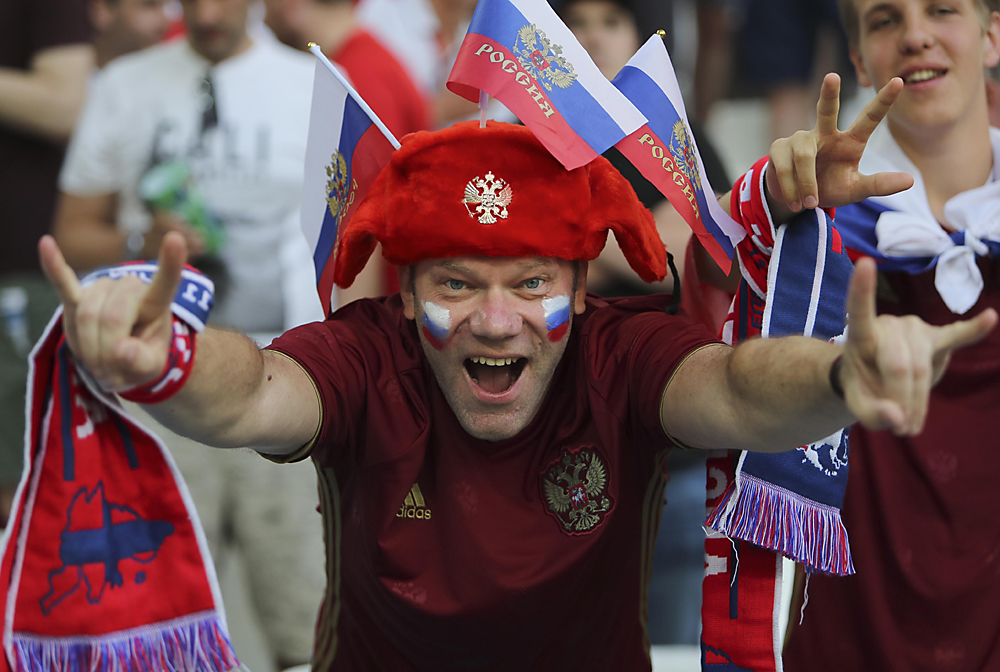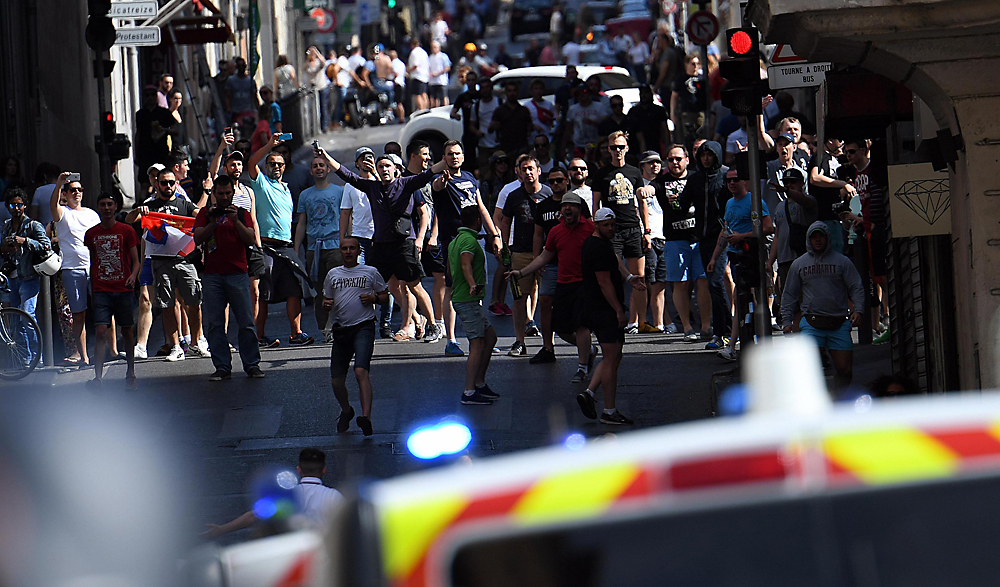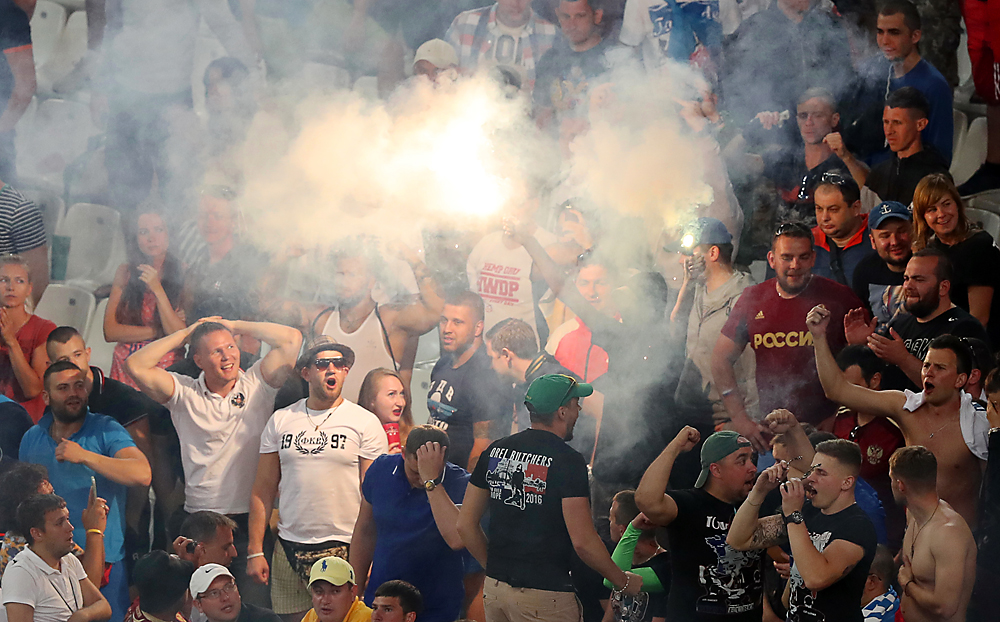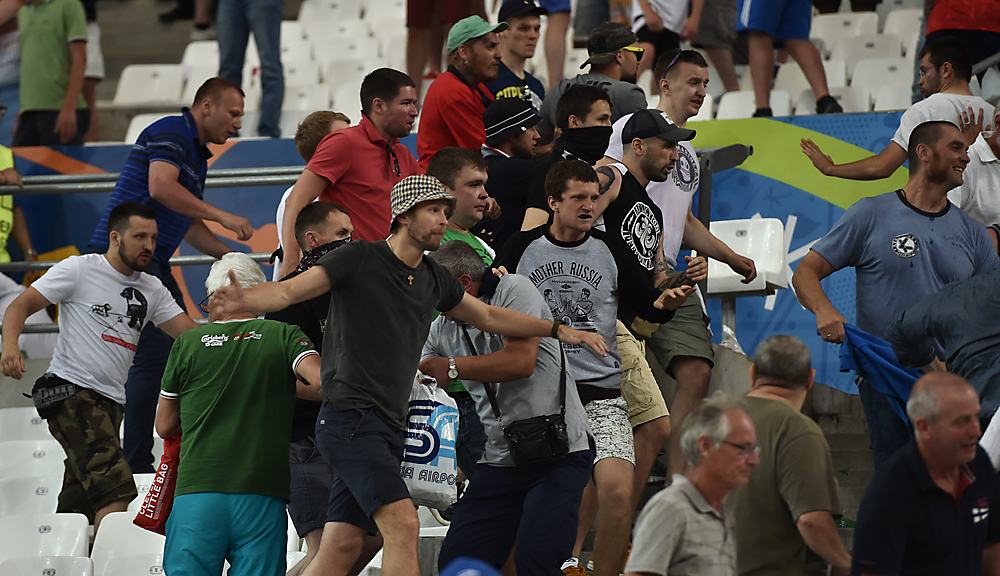
A Russian supporter cheers prior to the Euro 2016 Group B soccer match between England and Russia, at the Velodrome stadium, in Marseille, France, Saturday, June 11, 2016.
APThe first united group formed around Moscow's Spartak team in 1972 in Soviet times.
In the 1990s the fans started organizing themselves into so-called firms - groups with the most faithful supporters who were willing to use force to protect the honor of their club. In 1994 Spartak fans formed the Flint's Crew clan, while CSKA fans established the Red-Blue Warriors.
"In 99 percent of the cases these people will take action in dangerous situations. It is a certain fan code. They can be peaceful people, sit in their offices, but during matches they go crazy in a way. The ultras' function is to protect the club or the national space, as well as their dignity. They are martyrs. If a war begins, these people will go fight in the trenches," said Andrey Malosolov, founder of the Red-Blue Warriors.
Almost 15,000 Russian fans went to Euro 2016. About 10,000 of them bought their tickets through the UEFA lottery. A year before the beginning of the tournament anyone who wanted could request a ticket. The lottery determined the winners, who then still had to pay for the tickets.
 Russian fans in a street at the Old Port of Marseille, France, 11 June 2016, before the UEFA Euro 2016 group B preliminary round match between England and Russia. Source: EPA
Russian fans in a street at the Old Port of Marseille, France, 11 June 2016, before the UEFA Euro 2016 group B preliminary round match between England and Russia. Source: EPA
The All-Russian Fan Association handed out a further 5,000 tickets. An anonymous source from the association told RBTH that 400 of those tickets were given to ultras.
"These are the guys that were fighting the English in Marseilles' Old Port and later broke through the police cordon at the Stade Velodrome," the source said.
"You can't really say that they instigated the street incidents. They didn't fight with those they saw first, but invited them to fight. Some took up the invitation but most of the English abandoned the port. At the stadium the ultras were provoked. The English were taunting the Russian fans the entire match and they just couldn’t restrain themselves anymore."
It is not clear. But officially Russian Presidential press secretary Dmitry Peskov condemned the ultras and called on them to respect French law.
 Russian fans light flares during the UEFA Euro 2016 group B preliminary round match between England and Russia at Stade Velodrome in Marseille, France, 11 June 2016. The match ended 1-1. Source: EPA
Russian fans light flares during the UEFA Euro 2016 group B preliminary round match between England and Russia at Stade Velodrome in Marseille, France, 11 June 2016. The match ended 1-1. Source: EPA
UEFA has the right to review only those episodes that take place inside a stadium. The events that occurred in Marseilles before the match do not fall under the organization's jurisdiction. UEFA handed the Russian team a suspended sentence because the Russian fans broke into the English sector at the stadium.
 Russian supporters (center) chase other supporters away during clashes in the stands at the end of the match between England and Russia. Source: EPA
Russian supporters (center) chase other supporters away during clashes in the stands at the end of the match between England and Russia. Source: EPA
A Marseilles court found the Russian fans guilty of creating disorder at the Marseilles port. Many international commentators have noted that there is no documented proof of the Russians fighting. Russian Sports Minister Vitaly Mutko says that lawyers are looking into the case.
The most notorious incident involving Russian fans took place in June 2002. After the Russian national team lost to Japan in the group stage during the World Cup, drunken fans (alcohol was sold before the match on the streets) turned over cars, broke shop windows and brawled in the center of Moscow. As a result 75 people were injured, of whom 49 were hospitalized and one died.
One of the most brutal incidents occurred in St. Petersburg during a Zenit-Dynamo match on May 11, 2014. At the end of the match, which ended in a 4-2 win for Dynamo, a number of fans broke through the cordon and ran onto the field. One of the fans ran up to Dynamo defender Vladimir Granat and hit him in the face, causing injuries that resulted in severe concussion.
A so-called law on fans came into effect in January 2014. It forbids fans from bringing alcohol and pyrotechnics into stadiums, as well as shouting obscene slogans and waving offensive banners. Violators are liable to fines of up to 15,000 rubles ($230). Second offenders face jail terms of up to 15 days or a ban on attending any sporting event for seven years.
Moreover, in June 2016 the State Duma introduced a bill on a public register of fans that are forbidden from attending sports events.
All rights reserved by Rossiyskaya Gazeta.
Subscribe
to our newsletter!
Get the week's best stories straight to your inbox